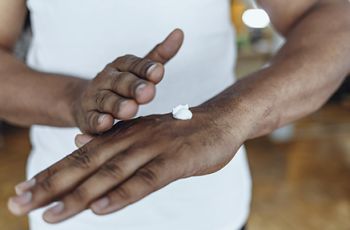The vital signs — pulse, blood pressure, temperature, respiratory rate, and sometimes pain — are the ABCs of the health care professions; the building blocks upon which future decisions and communications are based. They are so important that Jimmie Holland, M.D., Wayne E. Chapman Chair in Psycho-Oncology at Memorial Sloan-Kettering Cancer Center, wants to add another to the list: distress.
“It’s a word to try to bridge this problem of people not wanting to hear something psychiatric,” she said at second annual Resnik Family Lecture in Psychiatry and Palliative Care, hosted Jan. 27 by The George Washington University School of Medicine and Health Sciences. “Distress,” she said, can be used as a tool in the clinic to discuss, monitor, and treat cancer patients’ mental health.
This effort is one of Holland’s most recent pushes to integrate the fields of oncology and psychiatry — a discipline known as psycho-oncology. As the field’s founder, Holland discussed its birth, growth, and challenges during her lecture, “Contributions of Psycho-Oncology to the Human Side of Cancer Care.”
The relative novelty of psycho-oncology can be attributed to numerous historical barriers, Holland said. Physicians have not been traditionally trained to broach mental health issues, and mental illness is laden with stigma. Even cancer, which used to be seen as a “death sentence,” has suffered some historical stigmatization, she said.
In many ways, the birth of the field can be attributed to “benign nepotism,” Holland admitted. When her husband, pioneer medical oncologist James Holland, M.D., was the chair of the Cancer Leukemia Group B (a clinical trials group funded by the National Cancer Institute) in the late 1970s, the group was mandated to become multidisciplinary. “You’ve got to add psychiatry to this,” Holland told him. “You get their blood, their urine, their feces, and yet, nobody asks them how they are feeling.’”
From there, she established a committee within the group to study psychological issues. The group developed quantitative assessment tools to measure quality of life, marking the first time that cancer patients’ outcomes were not only a measure of survival, but also a measure function.
“Once we could measure outcomes, then we could begin to develop innovative interventions…and measure the impact of these interventions on some quantifiable outcomes,” she said. “This is kind of the heart of how we began to be, I think, a more acceptable entity in the scientific oncologic community.”
In effect, the field — and Holland’s career — blossomed. She became the founding president of the International Psycho-oncology Society in 1984, and of the American Psychosocial Oncology Society in 1986. She co-edited the first of many psycho-oncology textbooks in 1989, and began the first international journal in the field in 1992.
In 1997, Holland led a panel at a National Comprehensive Cancer Network, an organization that develops clinical guidelines. It was here that the word “distress” was suggested as a way to get mental health conversations into the clinic. The group created a “distress thermometer,” which patients can complete in the waiting room. “It begins to clarify who needs help and who doesn’t,” Holland explained.
In 2005, the National Institute of Health granted Holland and her colleagues $1 million to review the barriers to psychosocial care. “We looked at the literature to see if the things we do make a difference,” she said. And they did: first and foremost, the key role of doctor-patient communication was evident. The review also demonstrated the effectiveness of psychotherapy in coping ability and distress reduction; and brought to light good psychopharmalogical data in the area.
In perhaps the biggest turning point in the movement, the Institute of Medicine (IOM) announced a new standard of quality cancer care in 2007, stating that psychosocial interventions must be integrated into routine cancer care and clinical practice guidelines. “This was a big plus for us, because we had never had a big policy-making body like the IOM endorse this,” said Holland, who served on the Institute’s Multidisciplinary Committee.
Looking into the future, Holland called for more research, particularly in the area of cancer genetics. While symptoms like fatigue and anxiety used to be viewed as purely psychological, she pointed to a growing body of evidence indicating that individuals’ genetic makeup can influence such symptoms’ severity. Additionally, the experience of “chemo brain,” or a mental fog that often accompanies chemotherapy treatments, has been linked to the same allele that is associated with Alzheimer’s disease, she said.
Building collaborations also remains a top priority for Holland and her colleagues. They continue to form alliances among professional organizations and advocacy patient advocacy groups in order to raise awareness and demand for the integration of mental health services in cancer care. One key player, the American Society of Clinical Oncology, has adopted a rating system evaluating oncology practices on the quality of their psychosocial care. “We have moved to bring this up to another level of awareness and we are hoping that these kinds of moves will begin to impact upon care at the clinical level,” said Holland.
About the Resnik Family Lecture Series:
The Resnik Family Lecture Series honors Drs Rebecca and Harvey Resnik, pioneers in psychiatry and palliative care. Rebecca Resnik, M.D., is a graduate of GW’s School of Medicine and Health Sciences and is currently the medical director and co-lead physician of the Denver Hospice and an assistant clinical professor of internal medicine at the University of Colorado Health Sciences Center. Harvey Resnik, M.D., is a GW emeritus clinical professor of psychiatry and behavioral sciences and an expert in the fields of suicide, psychiatric emergencies, and disaster response.


